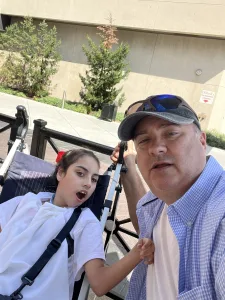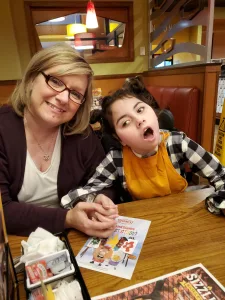2024 Health Insurance Education Webinar Series for Families Kicks Off in March
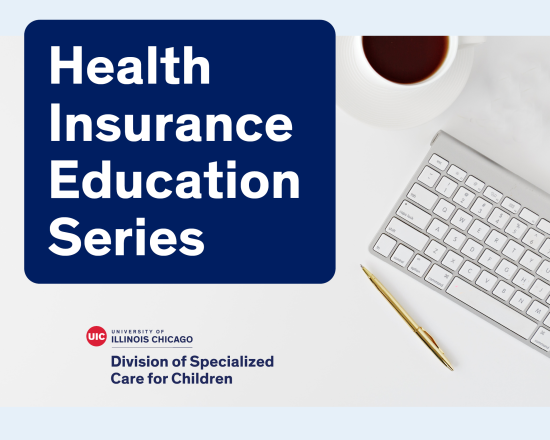
Free virtual training sessions for Division of Specialized Care for Children participants, their families and anyone interested in learning more about health insurance topics
Is figuring out your health insurance leaving you confused, frustrated or both?
Change your confusion to confidence with the University of Illinois Chicago’s Division of Specialized Care for Children (DSCC) Health Insurance Education Series.
These free trainings can help you better navigate your health insurance coverage and benefits. Each month, DSCC team members and other presenters will explain a different topic.
Each presentation will be in English. A Spanish interpretation line will be available during each session.
Check out the topics, mark your calendars and register for each session you’re interested in attending.
The session descriptions are in English followed by Spanish:
- Social Security Benefits, March 12 at 6 p.m.
- This training will help you understand Social Security benefits. Presenters from the Social Security Administration will share information about Supplemental Security Income and Social Security Disability Insurance. You will learn who can get benefits and how to apply for benefits. It will also cover what the Social Security program benefits are and how to keep your benefits.
- See the Social Security flyer for more details.
- Register on Zoom for Social Security Benefits
- Medicaid Denials, April 9 at 6 p.m.
- This training will help you understand Medicaid denials. It will review the common reasons that Medicaid denies services, such as equipment. The presentation will also share tips on how to avoid denials and what to do if Medicaid denies your services. This training will be for those with regular Medicaid and those enrolled in a managed care plan (MCO).
- See the Medicaid Denials flyer for more details.
- Register on Zoom for Medicaid Denials
- Transitioning Health Insurance Benefits to Adulthood, May 14 at 6 p.m.
- This training will help you understand how to transition health insurance benefits to adulthood. It will go over different insurance types, including Medicaid, Medicare and private insurance. This presentation will help you know what to start thinking about for health insurance benefits as you or your child nears adulthood.
- See the Transitioning Health Insurance Benefits to Adulthood flyer for more details.
- Register on Zoom for Transitioning Health Insurance Benefits to Adulthood
- Beneficios de Seguro Social, 12 de marzo a las 6 p.m.
- Esta capacitación lo ayudará a entender los beneficios del Seguro Social. Los presentadores de la Administración del Seguro Social compartirán información sobre el Seguro de Ingreso Suplementario y el Seguro de Incapacidad del Seguro Social. Aprenderá quién puede obtener beneficios y cómo solicitarlos. También cubrirá cuáles son los beneficios del programa de Seguro Social y cómo conservar sus beneficios.
- Consulte el folleto de Beneficios de Seguro Social para obtener más detalles.
- Enlace para registrarse
- Negaciones de Medicaid, 9 de abril a las 6 p.m.
- Esta capacitación lo ayudará a comprender las negaciones de Medicaid. Revisará las razones comunes por las que Medicaid niega servicios, como equipos. La presentación también compartirá consejos sobre cómo evitar negaciones y qué hacer si Medicaid niega sus servicios. Esta capacitación será para quienes tienen Medicaid regular y quienes están inscritos en un plan de atención administrada (MCO).
- Consulte el folleto de Negaciones de Medicaid para obtener más detalles.
- Enlace para registrarse
- Transición de los beneficios del seguro médico a la edad adulta, 14 de mayo a las 6 p.m.
- Esta capacitación lo ayudará a comprender cómo hacer la transición de los beneficios del seguro médico a la edad adulta. Tratará diferentes tipos de seguros, incluidos Medicaid, Medicare y seguros privados. Esta presentación le ayudará a saber en qué empezar a pensar en cuanto a los beneficios del seguro médico a medida que usted o su hijo se acercan a la edad adulta.
- Consulte el folleto de Transición de los beneficios del seguro médico a la edad adulta para obtener más detalles.
- Enlace para registrarse
You can also download a flyer with all the Health Insurance Education Series topics and registration links. (The flyer is also available in Spanish.)
The webinars are open to DSCC participants, their family members and anyone interested in these topics.
This is the second year for the DSCC Health Insurance Education Series. It began in response to DSCC families’ questions and suggestions from our Family Advisory Council.
Details about each series session are also posted on our Events page.
The 2024 Health Insurance Education Series is free for all attendees.
If you miss a session, you can access the recordings and related materials on our Family Education Webinars page.
If you have questions about these webinars before or after a session, email dscc@uic.edu or call (800) 322-3722.
We look forward to seeing you online!
Announcing Rate Increases for In-Home Nurses

Increased rates for in-home nurses will take effect on Jan. 1, 2024.
We have an exciting update for our participants enrolled in the Home Care Program.
The Centers for Medicare and Medicaid have approved a rate increase for in-home nurses in the new year.
We hope this rate increase can help expand available and high-quality nursing options for our participant families.
This rate increase affects:
- Registered nurse (RN), licensed practical nurse (LPN) and certified nursing assistant (CNA) care
- In-home and facility-based respite care
- Nurse training rates
This increase will take effect Jan. 1, 2024. The rates are as follows:
- RN, $54 per hour
- LPN, $45 per hour
- CNA, $30 per hour
You can see the updated Home Health Fee Schedule on the Illinois Department of Healthcare and Family Services (HFS) website.
The following rate increases are for participants who are in the Home and Community-Based Services Waiver for Those Who Are Medically Fragile, Technology Dependent (MFTD):
- Nurse training for an RN, $54 per hour
- Nurse training for an LPN, $45 per hour
- In-home respite for an RN, $54 per hour
- In-home respite for an LPN, $45 per hour
- In-home respite for a CNA, $30 per hour
HFS will also increase the maximum amount for nurse training service hours from four to 32 hours per nurse per waiver year.
As a reminder, parents and legally responsible adults who have an RN or LPN license can be paid caregivers. (Parents and legally responsible adults who are CNAs cannot be paid caregivers at this time.)
HFS will increase your nursing resource allocation amounts to reflect the increase.
Your Division of Specialized Care for Children (DSCC) care coordination team can help you with any questions about the rate increase or nursing services.
You can also find more helpful information about Home Care Program services on our website’s Home Care Information Hub.
Home Care Region 2 Care Coordinator Earns DSCC’s Award of Merit
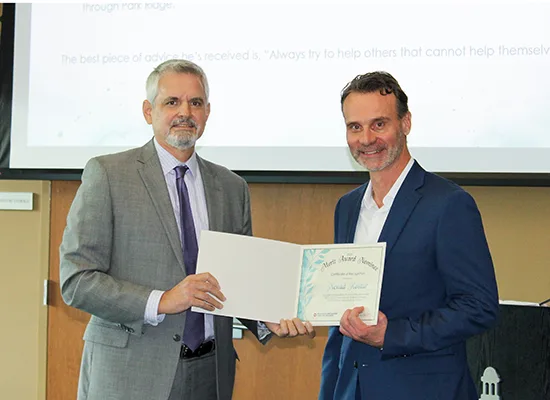
DSCC honors Ned Kostur for outstanding service to Illinois children and youth with special healthcare needs and their families
Care Coordinator Ned Kostur is the 2023 recipient of the University of Illinois Chicago’s Division of Specialized Care for Children (DSCC) Merit Award.
The award recognizes exceptional employees for outstanding dedication and service to Illinois children and youth with special healthcare needs.
“Ned is an outstanding Care Coordinator. He is a trusted mentor to his teammates and a caring and dedicated partner to the families he serves, helping meet their needs and improve the quality of their lives,” DSCC Executive Director Thomas F. Jerkovitz said.
Ned is based in our Lombard Regional Office and works for DSCC’s Home Care Region 2. As a Care Coordinator in the Home Care Program, he helps families of children and youth who need in-home nursing to safely live at home.
Many of the DSCC participants Ned works with are on the Home and Community-Based Services Waiver for Those Who are Medically Fragile Technology Dependent (commonly called the MFTD waiver). These children and youth have more complex medical needs that require a higher level of care.
Ned helps educate their families about the services and benefits of the MFTD waiver and other state programs that can help meet their needs. He also guides families through the process of modifying their homes to support their child’s medical care and equipment.
“I meet with families, which I enjoy very much. It’s just a rewarding experience to get a piece of equipment or to finally find that right nursing fit for that family and just to see the smile on the family’s face as we’re aiding them in their journey in helping their child,” Ned said. “It’s just a great organization to work for.”
Ned began his journey with DSCC in 2003. Over the last two decades, he has worked in both the Core and Home Care programs.
Ned is a “go-to” for his colleagues who describe him as caring, compassionate, considerate, and hard-working. They also love how his passion for serving our participant families shines through in all his actions.
“Ned exemplifies what great care coordination looks like and its positive impact on the families we serve,” said Terri-lynn Jones Wood, Assistant Director of Home Care Operations for Regions 2, 4 and 6.
“He has a true desire to bring families a sense of relief and understanding that they have someone on their side, someone they can trust and rely on,” Home Care Region 2 Regional Manager Mariangely Spilotro-Marquez added.
“He takes great pride in his work and ensuring that families understand Home Care, the services provided, what his role is and how he can assist them.”
Ned draws on his experience in clinical psychology, biology, treatment and discharge planning, quality assurance, teaching and more to help others. His Lombard teammates appreciate his wealth of knowledge about DSCC processes and resources, sense of humor and willingness to help in any situation.
“He has shown me what it means to be dedicated, empathetic and professional,” Program Coordinator Assistant Kimberley Firkins said. “Ned’s the perfect example of what it means to partner, help, and connect, not only with our families and providers but also within the organization, with his teams, and his co-workers.”
Learn more about Ned and his exceptional service to families in this video below:
DSCC staff nominated a total of five of their colleagues for this year’s Merit Award. As the winner, Ned receives a Merit Award memento, a $2,500 award and recognition from the Executive Director.
The other 2023 nominees are:
- Elizabeth “Liz” Bailey, Home Care Enrollment Manager, Lombard Regional Office
- Lisa Garbe, Assistant Regional Manager. Marion and Olney Regional Offices
- Mayra Rubio, Bilingual Care Coordinator, Mokena Regional Office
- Amanda Simhauser, Communications Manager, Central Administrative Office in Springfield
A big congratulations to Ned and all the 2023 nominees! We are grateful for your service and commitment to Illinois families!
DSCC Dad Helps Superheroes of All Abilities Unite in Southern Illinois
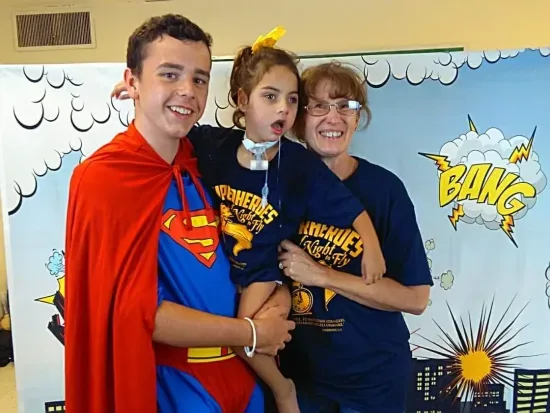
Pastor Tim Reynolds organizes the annual Special Needs Superheroes event to take place in Mount Vernon on Oct. 28
In Mount Vernon, superheroes of all kinds unite each year to bring joy to children and adults with disabilities.
Mount Vernon Baptist Temple’s annual Special Needs Superheroes event encourages individuals of all ages and abilities to dress as their favorite superhero and enjoy fall activities together. This popular free celebration returns for its fifth year on Oct. 28.
Pastor Tim Reynolds helped create the event and credits his wife, Melissa, and a dedicated group of volunteers with keeping it running. Reynolds’ daughter Isabella has complex medical needs and is a participant with the University of Illinois Chicago’s Division of Specialized Care for Children (DSCC).
Reynolds said the idea for the event came from a desire to serve his small community in southern Illinois.
“It can be hard for families and individuals with disabilities to go to a theme park. We have a church with a good layout, nice grounds, and a gymnasium,” Reynolds said. “I pastor two churches, and we decided to work together to create a special day for young and old alike that was as close to a carnival atmosphere as possible.”
Choosing a superheroes theme, the first event kicked off in 2018.
“I’m not sure why we chose the superheroes theme, but it fit, and it’s lots of fun. The first year we had about 400 attendees,” Reynolds said.
The event continued to grow each year except for a one-year gap in 2020 due to the COVID-19 pandemic.
“This year we’re planning for more than 800 guests. We have a bunch of folks who love Comic-Con. They have amazing costumes and travel from Missouri, Kentucky, Indiana and other places to help us year after year,” Reynolds said.
Volunteers from churches, 4-H clubs, government, and more serve as “buddies.” They help participants of all ages and abilities experience activities that include:
- A petting zoo and horseback rides
- Face painting and games
- Balloon tying with Rainbow the Clown
- Superhero photos
- Haircuts
- Brats, hamburgers, snow cones and popcorn
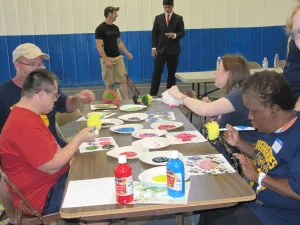
“It’s just a big kick. Some people like dressing up, others just like taking it all in,” Reynolds said. “I really love the horseback riding and seeing them with the animals. For some, it’s the first time they’ve ever ridden a horse or been able to touch and be up close to these animals. They’re so uninhibited in expressing their excitement and joy. You can’t help smiling all over.”
The guest list also includes community members and residents from area Community Integrated Living Arrangement (CILA) Homes.
The whole Reynolds family, including Isabella and her three older siblings, also take part in the fun.
Reynolds said his wife, Melissa, organizes all the details for the superheroes event. She prefers to remain in the background while he is “just the promoter and front man.”
“She is the rock of our family and works tirelessly caring for Isabella,” Reynolds said.
Isabella has Moebius syndrome, a rare neurological disorder that can cause paralysis, an inability to smile and other disabilities.
“We adopted her as a baby and the doctor said she wouldn’t live past a year old,” Reynolds said. “She’s a happy girl and recently turned 12.”
Isabella enrolled with DSCC shortly after birth and receives services through the Home Care Program. The Home Care Program helps children and young adults who need in-home nursing to safely live at home.
“We connected with DSCC at the hospital and really appreciate all that they do,” Reynolds said. “DSCC has helped us track down nursing services and medical equipment. They’re always there to help and are another go-to when you need help filling in the gaps.”
Members of our DSCC team from the St. Clair Regional Office will be at this year’s Special Needs Superheroes event to speak with families about our services.
The event takes place from 4 to 6:30 p.m. on Oct. 28 at Mount Vernon Baptist Temple, 817 Woodland Drive, in Mount Vernon. There is no charge to attend.
“Everything is completely free,” Reynolds emphasized. “There’s nothing better than the smiles and hugs you get from kids with sno-cone-covered faces. We started all of this to be a blessing to someone, but I think we, the volunteers, are truly the ones who go away blessed.”
See the Special Needs Superheroes flyer for more details or visit the Events section of our website.
If you’d like to attend, please call or text (618) 315-1111 to register. The deadline to sign up is Oct. 23.
New Training Resources on Caring for Children With Trachs
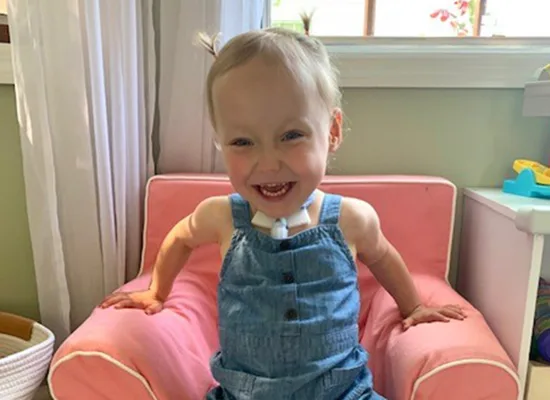
A new video and an updated free online course are available to help support the care of children with tracheostomy tubes
Parents and caregivers have a lot to learn when their child needs a tracheostomy (trach) tube to breathe.
Our Division of Specialized Care for Children (DSCC) team is here to support and guide families through learning how to care for their children’s complex medical needs.
We’ve gathered two new training resources to help families understand trach care.
Lurie Children’s Hospital Video on How to Handle Trach Emergencies
When emergency situations occur, it’s very important to keep the child’s trach tube open and in place.
Ann and Robert H. Lurie Children’s Hospital of Chicago has developed a video to help parents, caregivers and others know how to handle emergency situations with pediatric trach patients.
In this video, Lurie nurses explain:
- How to prevent and assess emergency situations
- How to manage a mucous plug
- How to replace a trach tube that has become dislodged
- What to do if the trach tube is difficult to replace
- When to provide manual ventilation using bag to trach tube, bag and mask to mouth, and mouth to mouth
We encourage our participant families in the Home Care Program to watch this video. Many of the children and youth in the Home Care Program rely on trachs and ventilators to breathe.
Please note that watching this video alone is not enough training to safely care for a child with a trach. Families should speak with their child’s doctors and care team about any questions or training needs.
For more information on how to safely care for a trach tube, you can visit Lurie’s Tracheostomy Care at Home webpage.
Free eHomeCare Course on How to Care for Children With A Trach
An updated free online course is available on how to care for children with trachs with or without a ventilator.
The eHomeCare program training is for:
- Nurses working in home-based environments
- Physicians
- Respiratory therapists
- Family members and caregivers of children with trachs with and without ventilators
- Students from health professions
The course is available until Sept. 30, 2026.
Learners can use this course for initial training, an annual review or as an ongoing resource.
The course learning objectives are:
- Describe best practices for providing day-to-day care for children with trachs with or without ventilators in the community
- Explain how to manage emergency situations for children with trachs with or without ventilators in the community
- Report an increase in confidence when caring for children with trachs with or without ventilators in the community
- Describe the roles and responsibilities of members of the healthcare team.
Free continuing education credits are available.
If you have trouble enrolling in the course or need help, please email help@icep.wisc.edu.
Again, please note that families should speak with their child’s doctors and care team about any questions or training needs for their child with a trach.
Our participant families can also contact their DSCC Care Coordinator with questions.
Important Reminders: End of Public Health Emergency and Return to In-Person Visits
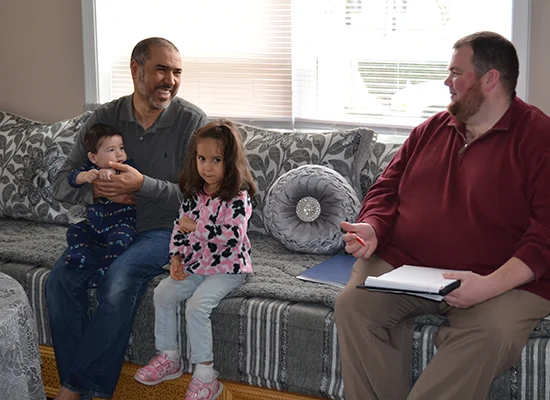
An overview of key changes affecting all Division of Specialized Care for Children participants now that the public health emergency is over
The public health emergency due to the COVID-19 pandemic ended on May 11, 2023.
This ending brings a variety of changes for our Division of Specialized Care for Children (DSCC) participant families. These changes include a return to in-person visits from DSCC Care Coordinators, an end to verbal signatures and more.
The following sections give an overview of key points and important dates to remember:
- Reminders for All DSCC Program Participants
- Reminders for Home Care Program Participants
- Important Medicaid/Insurance Updates for All DSCC Participants in Medicaid
- Contact Reminders for All DSCC Program Participants
Reminders for All DSCC Program Participants
Return to In-Person Visits
Meeting in person with our participants and families is an important part of care coordination. The public health emergency allowed face-to-face visits to occur virtually. Now that the public health emergency has ended, we must return to face-to-face meetings with our participants.
Your DSCC Care Coordinator will work with you in advance to schedule your next in-person/home visit. We understand that in-person visits with your Care Coordinator may be a change for you and your family. We paused these visits for several years during the public health emergency (though many families continued to meet with their Care Coordinator during the pandemic).
Seeing you in person helps us get to know you and your family better. It can also help improve your connection with your DSCC Care Coordinator. Our partnership with Medicaid and Medicaid managed care plans also requires us to meet with you in person. If you have any concerns about in-person visits, please talk to your Care Coordinator. We will work with you to see how to best accommodate your preferences.
Verbal Signatures
The public health emergency allowed your Care Coordinator to receive necessary signatures verbally. As of May 11, 2023, it is a federal rule that DSCC can no longer accept verbal signatures.
- Electronic signature options (such as through Adobe) remain an option for families when signing DSCC documents.
Reminders for Home Care Program Participants
End of Continued Medicaid and Program Enrollment for Those Found Ineligibile for Services
Starting April 1, 2023, DSCC began working with the Illinois Department of Healthcare and Family Services (HFS) to reassess all Home Care Program participants who received a notice of ineligibility for the program since March 1, 2020. Now that the public health emergency has ended, HFS’ notices accurately list the approved level of services for you or your child.
- If you or your child received a notice of ineligibility for services since March 1, 2020, your services will remain in place until HFS completes a reassessment. The reassessment looks at your updated and current medical documentation and will occur before Sept. 30, 2023.
- If you or your child received a notice of reduced nursing hours since March 1, 2020, your Care Coordinator will complete the next reassessment of services at your regularly scheduled renewal time. Services will remain in place until this reassessment occurs.
Reminders for Individuals in the Non-Waiver Program (Nursing and Personal Care Services)
Now that the public health emergency has ended, all individuals who turn 21 and are not on the Home and Community-Based Services Waiver for Those Who Are Medically Fragile Technology Dependent (MFTD), will not be eligible for services. If you or your child were on non-waiver services and turned 21 between the dates of March 1, 2020, and March 31, 2023, services will end on Sept. 30, 2023. Your Care Coordinator will work with you to ensure you or your child is set with an alternate state waiver, such as the Division of Rehabilitative Services (DRS), if applicable.
For all non-waiver participants under age 21, you must continue to have Medicaid coverage to receive Home Care services. It is important that you submit the redetermination form from Medicaid to keep your coverage. If you fail to meet Medicaid eligibility or do not respond in time, HFS will cancel your Medicaid case. Your Home Care services will then also end.
Additional COVID-19 Respite Allotment
During the public health emergency, HFS approved an additional 336 hours of respite to use before the regular respite allotment. This additional respite is for all Home Care MFTD waiver participants. Starting Nov. 11, 2023, this additional COVID respite will expire. All respite used after Nov. 11, 2023, will come from the standard respite allotment.
Personal Protective Equipment (PPE)
During the public health emergency, nursing agencies were reimbursed for PPE when actively staffing nurses in the home. The PPE is for the nurses to use while caring for participants. This reimbursement of PPE supplies to the nursing agencies will end on Nov. 11, 2023.
Nursing Supervisory Visits
Nursing agencies resumed in-person supervisory visits in November 2020. Effective May 11, 2023, there can be no exceptions to replace in-person supervisory visits.
Important Medicaid/Insurance Updates for All DSCC Participants in Medicaid
These next sections explain important Medicaid updates now that the public health emergency and continuous Medicaid coverage period has ended. The end of the public health emergency may also affect your Medicaid coverage or your private health insurance coverage.
No More Copays or Premiums for Medicaid
Most Medicaid programs no longer have premiums or copays. All Kids Assist, Aid to the Aged Blind and Disabled (AABD) and Adult Medicaid do not have monthly premiums or copays for services. All Kids Premium 1, Premium 2 and Share programs are all called All Kids Assist now.
Medical Redetermination for Medicaid
Redetermination is when Medicaid looks to see if you are still eligible. They look at your residency, monthly income and other criteria to decide if you still qualify.
Medicaid sent forms to some members as early as May 2023. They will not complete redetermination on all cases at the same time. They will make the redeterminations over several months. This means that your Medicaid redetermination could happen now or later, even next year. It is important to make sure Medicaid has your current address. You can report your address online at Medicaid.illinois.gov or call (877) 805-5312. We also have a news post with more details about how to update your address.
Please watch your mail for letters from Medicaid.
Once you receive your redetermination notice, you will have about a month to respond. Medicaid may ask for more information about your income, residency or other information. If Medicaid asks for more information and you do not respond, your Medicaid coverage ends. You can return the redetermination in several ways:
- Online at ABE.illinois.gov using Manage My Case. Manage My Case is the quickest way to complete your redetermination.
- By mail.
- In person at a local Illinois Department of Human Services (DHS) Family Community Resource Center.
- By phone.
If you are in a Medicaid managed care plan (MCO), please remember the MCO does not do the redetermination. Medicaid does redetermination reviews. If you do not qualify for Medicaid anymore, your coverage ends. If you are still eligible, you keep your Medicaid coverage.
Don’t risk losing your health insurance. Please update your address with Illinois Medicaid. It’s easy, fast and free:
- Call (877) 805-5312 from 7:45 a.m. to 4:30 p.m., Monday through Friday.
- Visit medicaid.illinois.gov.
- If you use a TTY, call (877) 204-1012.
Please contact your DSCC Care Coordinator if you have questions about Medicaid redetermination.
Telehealth Coverage
Telehealth coverage for Medicaid (and other insurances) is a permanent change and will continue after the public health emergency to give Medicaid time to review for any future changes. You can review the HFS Provider Notice issued May 9, 2023, on Telehealth to learn more.
An Illinois law signed in 2021 requires insurance to cover telehealth through 2027. This law does not require that practitioners or providers offer telehealth services. Therefore, your providers may not offer telehealth care. The law only says that insurance must pay providers for telehealth care if they provide it.
Pharmacy Billing and Prior Approval Requirements
Pharmacy billing and prior approval requirements for Medicaid will resume. There were many flexibilities that allowed Medicaid members to get medications. These include overriding the refill too soon and waiving requirements for the preferred drug list, quantity and brand limits. If you go to the pharmacy and they tell you that you can’t get your medications, ask your doctor to submit a prior approval to Medicaid. You can review the HFS Provider Notice issued May 3, 2023, on Pharmacy Billing to learn more. Contact your DSCC Care Coordinator for more help.
DME and Therapy Prior Approval Requirements
DME and therapy prior approval requirements for Medicaid will resume. There are some services that Medicaid did not require a prior approval for during the public health emergency. These services include therapy, home health and some durable medical equipment (DME). It is important for your providers to get a prior approval so that Medicaid reviews medical eligibility for the services. You can review the HFS Provider Notice issued April 4, 2023, on Prior Approval Requirements for more details. Contact your DSCC Care Coordinator for more help.
COVID-19 Tests, Treatment, and Vaccines
Uninsured individuals will no longer get access to special COVID-19 Medicaid eligibility which included testing, services, treatment, and vaccine administration during the public health emergency. You can view the HFS Provider Notice issued May 9, 2023, on Uninsured Population Special COVID-19 Coverage. Medicaid members who do have eligibility will continue to be able to access treatment, testing and vaccines.
Those with private insurance should also be able to continue to access treatment and vaccines as outlined by their plan.
Insurance plans will no longer cover over-the-counter tests for COVID-19 for free. Generally, a doctor will need to order the test and provide them in an office or similar facility. This may vary from plan to plan. You should call your insurance plan if you have questions. There may also be community organizations or public health departments still distributing COVID-19 tests and related services, such as vaccines, for free.
Extension of COBRA
During the public health emergency, there was an extension of election and notice deadlines for someone to take COBRA after losing or leaving a job. That will expire 60 days after May 11, 2023.
Temporary Special Enrollment Period
For individuals who no longer qualify for Medicaid after they go through redetermination, there is a special open enrollment period through the federal health insurance marketplace to purchase private insurance. It will extend from March 31, 2023, to July 31, 2024. This is only for people with a special qualifying event, such as losing coverage. Otherwise, the regular open enrollment period will be in November and December for individuals who need to enroll in private insurance through the marketplace. The Illinois website is GetCovered.illinois.gov and the federal website is HealthCare.gov.
Questions? Contact Us!
As a DSCC participant family, you can contact us with any questions or support your family needs.
Please note the best way to reach your care coordination team or any DSCC office is through our toll-free number of (800) 322-3722.
You can use this number to dial your Care Coordinator’s direct extension or to have our Customer Service Representatives connect you with the right person/team.
We have updated our phone system and ask everyone to use the (800) 322-3722 number as the simplest and fastest way to reach us.
Our office hours are 8 a.m. to 4:30 p.m. Please talk to your Care Coordinator if you have a need to speak outside of business hours.
You may also reach us through our general dscc@uic.edu inbox or use our Contact Us or Request a Callback forms on our website.
Please talk with your Care Coordinator if you have more questions or need to update your communication preferences.
We are thankful for your partnership throughout the changes related to the end of the pandemic and public health emergency. Our team will continue to help support your family and connect you with the right services and resources.
Important Updates on the End of Continuous Medicaid Coverage and Appendix K
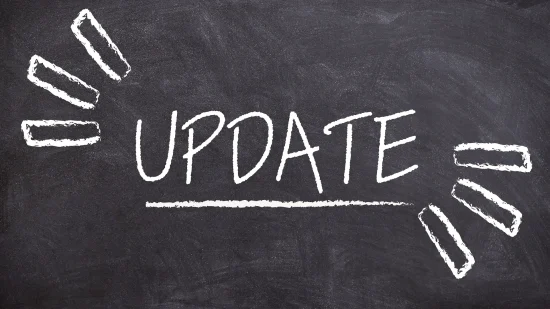
Key dates to know and an overview of the impact on DSCC participants and families
We are starting to prepare for the end of the public health emergency due to the COVID-19 pandemic. We’ve put together important information about how it will affect our Division of Specialized Care for Children (DSCC) participants and their families.
When the public health emergency took effect in 2020, the federal government allowed continuous Medicaid coverage and flexibilities for individuals receiving services through a Medicaid waiver. The federal government has signaled that the public health emergency will end on May 11, 2023. Please note the federal Centers for Medicare and Medicaid has not yet confirmed this date in writing.
We want to keep our participants as up-to-date as possible and will let you know if this date changes. In the meantime, we want to explain what changes will occur once the public health emergency and continuous Medicaid enrollment end.
The following sections give an overview of:
- The end of continuous Medicaid coverage
- The changes for all DSCC participants and families
- The impact on those enrolled in the Home Care Program
End of Continuous Medicaid Coverage
When the public health emergency began in 2020, the federal government allowed for continuous Medicaid coverage. This flexibility meant no one would lose Medicaid coverage during this time. The federal government is now ending continuous Medicaid coverage on March 31, 2023.
Starting April 1, Illinois Medicaid must review eligibility for all Medicaid cases. This process is called redetermination. Redetermination is when Medicaid looks to see if you are still eligible. They look at your residency, monthly income and other criteria to decide if you still qualify.
Medicaid will send forms to some members as early as May 2023. They will not complete redetermination on all cases at the same time. They will make the redeterminations over several months. This means that your Medicaid redetermination could happen in May or later this year.
It is important to make sure Medicaid has your current address. You can report your address online at Medicaid.illinois.gov or call (877) 805-5312. We also have a news post with more details about how to update your address. Please watch your mail for letters from Medicaid.
Once you receive your redetermination notice, you will have about a month to respond. Medicaid may ask for more information about your income, residency, or other information. If Medicaid asks for more information and you do not respond, your Medicaid coverage ends. You can return the redetermination in several ways:
- Online at ABE.illinois.gov using Manage My Case. Manage My Case is the quickest way to complete your redetermination.
- By mail.
- In person at a local Illinois Department of Human Services (DHS) Family Community Resource Center.
- By phone.
If you are in a Medicaid managed care plan (MCO), please remember the MCO does not do the redetermination. Medicaid does redetermination reviews. If you do not qualify for Medicaid anymore, your coverage ends. If you are still eligible, you keep your Medicaid coverage.
Don’t risk losing your health insurance. Please update your address with Illinois Medicaid. It’s easy, fast and free:
- Call (877) 805-5312 from 7:45 a.m. to 4:30 p.m., Monday through Friday.
- Visit medicaid.illinois.gov.
- If you use a TTY, call (877) 204-1012.
Please contact your DSCC Care Coordinator if you have questions about Medicaid redetermination.
Changes for All DSCC Program Participants:
- In-Person Visits: The public health emergency has allowed flexibility for in-person visits. As the public health emergency ends, DSCC must resume all in-person visits by Nov. 11, 2023. Your DSCC Care Coordinator will work with you to schedule your next in-person/home visit.
- Verbal Signatures: The public health emergency also allowed your Care Coordinator to receive necessary signatures verbally. As the public health emergency ends, we can no longer accept verbal signatures beginning May 11, 2023.
Impact on DSCC Participants in the Home Care Program:
The COVID-19 public health emergency has allowed several flexibilities for those in the Home Care Program in two separate areas:
- Continuous Medicaid and program enrollment for those found ineligible for services beginning March 1, 2020
- Appendix K flexibilities (Appendix K is an emergency coverage document for individuals receiving services through a Medicaid waiver.)
The following is important information about how the end of the public health emergency will affect Home Care Program participants.
End of Continued Medicaid and Program Enrollment for Those Found Ineligible for Services:
- There have been no reductions or loss of eligibility for Home Care participants since March 1, 2020. In 2022, the federal government separated the continuous Medicaid enrollment coverage provision from the public health emergency. As a result, continuous Medicaid coverage will end on March 31, 2023.
Starting April 1, 2023, DSCC will work with the Illinois Department of Healthcare and Family Services (HFS) to determine eligibility. We will reassess all Home Care Program participants who received a notice of ineligibility for the program since March 1, 2020. If you or your child received a notice of ineligibility for services since then, your services will remain in place until we complete a reassessment. The reassessment will look at your updated and current medical documentation. This includes individuals who appealed and were still deemed ineligible for services. Based on the new reassessment, HFS will send you an updated notice. This notice will state whether you or your child are eligible for Home Care services. Your DSCC Care Coordinator will work with you to complete a reassessment before Sept. 30, 2023.
- If you or your child received a notice of reduced nursing hours since March 1, 2020, your Care Coordinator will complete the next reassessment of services at your regularly scheduled renewal time. Services will remain in place until this reassessment occurs. After this reassessment, HFS will send you a new notice based on updated and current medical documentation. The notice will list the new level of services.
More Information for Individuals in the Non-Waiver Program (Nursing and Personal Care Services):
- You will no longer receive Home Care Program nursing services if you or your child turned 21 and are not on the MFTD waiver but still receive nursing. Your nursing services will end on Sept. 30, 2023. Your Care Coordinator will work with you to ensure you, or your child is set with an alternate state waiver, such as the Division of Rehabilitation Services (DRS), if applicable. If you or your child will turn 21 on or after March 31, 2023, services will end on the date indicated on the current notice of ineligibility.
- For all non-waiver participants under age 21, you must continue to have Medicaid coverage to receive Home Care services. It is important that you submit the redetermination form from Medicaid to keep your coverage. If you fail to meet Medicaid eligibility or do not respond in time, HFS will cancel your Medicaid case. Your Home Care services will then also end. For more information on the Medicaid redetermination timeline, see the dates above.
Appendix K Flexibilities
Appendix K is an emergency coverage document for individuals receiving services through a Medicaid waiver. Appendix K provisions took effect on March 1, 2020, to give flexibility to Home Care participants. Appendix K is tied to the public health emergency, which is determined by the federal government.
As we noted above, the federal government has indicated the public health emergency will end on May 11, 2023. Appendix K provisions would then continue for six months after the public health emergency ends. Therefore, Appendix K flexibilities will end on Nov. 11, 2023. However, DSCC worked with HFS to make two flexibilities permanent. Here are more details on what will change and what will remain in place:
- Licensed (RN or LPN) parent/LRA paid caregivers: Parents/legally responsible adults (LRAs), including foster parents, can continue to provide skilled nursing services to their child if they hold an active registered nurse (RN) or licensed practical nurse (LPN) license. DSCC sent a separate notice on this provision remaining permanent, which includes details on guidelines. (You can also read our news post on Home Care Program Changes Give Families More Flexibility and Support.)
- Overtime: Nursing agencies will permanently receive payment for providing overtime hours to Home Care participants. DSCC sent a separate notice on this provision remaining permanent, which includes details on guidelines. (You ou can also read our news post on Home Care Program Changes Give Families More Flexibility and Support.)
- Additional COVID-19 respite allotment: During the public health emergency, HFS approved an additional 336 hours of respite to use before the regular respite allotment. This additional respite is for all Home Care MFTD waiver participants. Starting Nov. 11, 2023, this additional COVID respite will expire. All respite used after Nov. 11, 2023, will come from the standard respite allotment.
- Personal Protective Equipment (PPE): During the public health emergency, nursing agencies were reimbursed for PPE when actively staffing nurses in the home. The PPE is for the nurses to use while caring for participants. This reimbursement of PPE supplies to the nursing agencies will end on Nov. 11, 2023.
- Nursing Supervisory Visits: Nursing agencies resumed in-person supervisory visits in November 2020. Effective May 11, 2023, there will be no exceptions allowed to replace in-person supervisory visits.
Please contact your DSCC Care Coordinator at (800) 322-3722 if you have questions or are unsure how this information may impact your family.
We are thankful for your partnership throughout the pandemic and public health emergency. Our team will continue to help support your family and connect you with the right services and resources.
Permanent Home Care Program Changes Give Families More Flexibility and Support
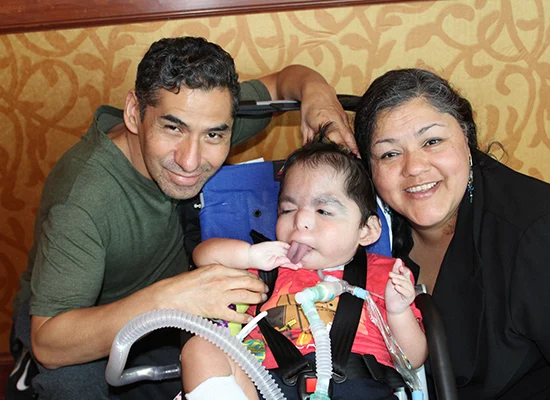
Paid licensed caregivers and nurse overtime are now permanent options for Home Care families
We have exciting news about long-term changes to the Home Care Program. We have listened to our participant families and made two pandemic-related benefits permanent. These changes can provide continued flexibility and support beyond the public health emergency.
When the COVID-19 pandemic began in March 2020, UIC’s Division of Specialized Care for Children (DSCC) partnered with the Illinois Department of Healthcare and Family Services (HFS) to address our Home Care families’ needs. Together, we set provisions included in Appendix K. Appendix K is an emergency coverage document for individuals receiving services through a Medicaid waiver.
We continued to partner with HFS to make two provisions permanent for Home Care participants. As a result, nurses can continue to provide overtime. Licensed parents/legally responsible adults (LRAs) can also remain paid nurse caregivers for their children enrolled in Home Care.
Below are more information and guidelines on these new permanent changes.
Licensed (RN or LPN) Parent/LRA Paid Caregivers
Parents or LRAs, including foster parents, can provide skilled nursing services to their children if they hold an active registered nurse (RN) or licensed practical nurse (LPN) license.
This approval includes participants enrolled in medically fragile, technology-dependent (MFTD) waiver services and non-waiver services. This approval is for all children approved for Home Care services, regardless of the child’s age.
Guidelines include:
- The licensed parent/LRA must be a nurse employee of a DSCC-approved nursing agency. The nursing agency sets the number of hours the parent can work each week.
- Services may begin on the licensed parent/LRA’s hire date.
- The licensed parent/LRA must meet all nursing agency rules for provider qualifications and training.
- The licensed parent/LRA can work overtime hours. Overtime is anything over 40 hours a week.
- The licensed parent/LRA must hold an active RN or LPN license.
- Licensed parents/LRAs may not provide respite services under the waiver.
- Licensed parents/LRAs cannot receive reimbursement for nurse training.
- The total nursing hours may not exceed the approved resource allocation.
Overtime
Nursing agencies will permanently receive payment for overtime hours to Home Care participants. Overtime hours benefit the participant and family. They also allow nurse caregivers to provide more nursing coverage to participants. The possibility of overtime also incentivizes the nurse caregiver to provide more coverage. Overtime allows nursing agencies to cover more authorized hours while stretching their staffing over fewer nurses. This is especially helpful to families during a time of increased demand for nurses.
Guidelines include:
- Under the Fair Labor Standards Act, overtime is anything over 40 hours a week.
- The Nurse Practice Act prohibits working more than 16 hours in a 24-hour period. An eight-hour break between shifts is also mandatory.
- Overtime is defined as time-and-a-half.
- Overtime reimbursement comes from the approved resource allocation. The amount billed cannot exceed the HFS-approved resource allocation.
- Those on the MFTD waiver cannot use overtime when using respite hours.
- Parents/LRAs who are nurse paid caregivers can work overtime. The parent/LRA is an employee of the nursing agency. The nursing agency determines the number of hours the parent can work each week. The number of hours cannot exceed the approved resource allocation.
- Nurses can only be eligible for overtime when Medicaid is the payer. When private insurance is the payer, nurses cannot receive overtime pay.
Please contact your DSCC Care Coordinator with any questions or concerns.
We hope these permanent changes will continue to benefit your family.
Share Your Feedback on the Nursing Allocation Process
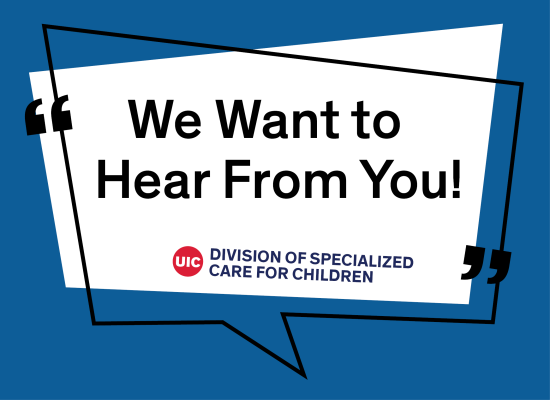
Help our Family Advisory Council recommend changes that can benefit Home Care Program participants and their families.
The Division of Specialized Care for Children (DSCC) helps coordinate and monitor in-home nursing for families through the Home Care Program.
The Illinois Department of Healthcare and Family Services (HFS) determines the number of approved nursing hours after reviewing the individual’s medical reports and medical needs.
Our Family Advisory Council (FAC) now wants to help families better understand the process for how HFS assigns nursing allocations. The FAC also wants to help HFS understand the unique needs and circumstances of Home Care families when deciding nursing allocations.
FAC Advocacy Chair Whitney Woodring is putting together a Nursing Allocation Workgroup to gather feedback on these issues. Whitney’s daughter Willa has received Home Care services since she was a baby. (See Willa’s Family Story for more details.)
Whitney hopes to speak with families across Illinois to learn about their experiences with nursing allocations and the appeal process.
You can email Whitney directly with feedback at w.woodring25@gmail.com.
Whitney would like to hear all input, including positive experiences with the process.
Your feedback will help Whitney and the FAC make recommendations for changes that can benefit as many participants as possible.
To learn more about the FAC, visit our Family Advisory Council page. Be sure to also join the FAC’s next open forum meeting on Nov. 10.
Need more information about nursing services and allocations?
Our Nursing Services Tip sheet gives an overview of Medicaid’s nursing services to help families in the Home Care Program take care of their child’s medical needs:
Our Home Care Appeal and Peer-to-Peer Review Tip Sheet explains how the review and determination of medical eligibility for Home Care services work:
- Appeal and Peer-to-Peer Review Tip Sheet in English
- Appeal and Peer-to-Peer Review Tip Sheet in Spanish
You can find these handouts and other helpful information for families on our Home Care Information Hub.
DSCC and State Health Department Partner to Improve In-Home Nursing Options for Families

A new licensure process for nursing agencies will help provide more options for children and adults in need of in-home nursing care
The nationwide nursing shortage has affected many Illinois families in need of in-home shift nursing care for their children with complex medical needs.
There is a constant demand for more in-home nursing care options in all parts of the state, both rural and urban.
The University of Illinois Chicago’s Division of Specialized Care for Children (DSCC) has partnered with the Illinois Department of Public Health (IDPH) to help meet this need and give families more nursing care options.
DSCC worked with IDPH to change how our enrolled nursing agencies are licensed to serve Illinois counties. Nursing agencies can now be licensed to serve all of Illinois instead of only individual counties.
This change should make it easier for nursing agencies to serve more parts of the state.
Before this change, nursing agencies could only operate within their approved service county area. Nursing agencies had to request approval for each county they wanted to serve.
This process made it difficult for nursing agencies to expand coverage to areas in need. Our participants who receive in-home shift nursing through the Home Care Program could only receive services from nursing agencies licensed for their specific county.
Now all nursing agencies who are licensed and enrolled with DSCC in good standing may serve all Home Care participants in any part of the state.
This broader statewide approach to nursing agency licenses will offer more available nursing options to our participant families.
Please note that each nursing agency must decide if it wants to expand its service area to other parts of the state. This decision is based on nursing staff availability.
We are thankful for IDPH’s partnership to help meet this important need for our participants and their families!




